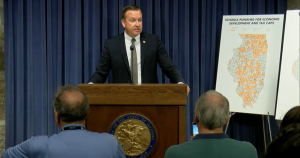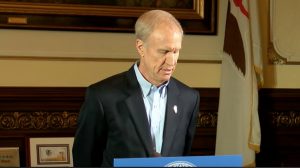School funding solution stalls as lawmakers, Rauner, bicker
By Jean Lotus Staff Reporter — August 4, 2017
Sen. Andy Manar (D-Bunker Hill) Aug. 3 in Springfield with charts showing school districts that will supposedly lose funding over ten years under Gov. Bruce Rauner’s amendatory veto of SB1. (Photo courtesy of Blueroomstream)
As the clock ticked toward opening day for Illinois schools, Gov. Bruce Rauner and Springfield Democrats seemed even more far apart on a compromise that would allow school districts to receive their first general state aid payments Aug. 10.
Prospects dimmed last week whether Springfield could come to agreement before checks are to go out this week. Most districts will be able to open their doors, but a lack of state funding will put unnecessary hardship on schools.
At issue was Senate Bill 1, a complicated school funding reform bill that Democrats say would level out inequities between school districts over time.
Both Rauner and Sen. Andy Manar (D-Bunker Hill) pointed fingers last week after
Rauner struck parts of the bill with an amendatory veto Tuesday, Aug. 2 and sent it back to the Senate.
The veto stripped out more than $200 million in block grants for Chicago Public Schools, which Rauner called a “bailout” and also removed $212 million in CPS pension help. Rauner said other school districts in Illinois should have access to the resources Chicago has mismanaged. But Democrats have said that Rauner was just trying to pit Chicago against the suburbs and downstate.
Rauner initially seemed confused Aug. 1 about the number of votes necessary to pass the amendatory veto. The changes in the law will require a three-fifths majority in both the Senate and House to pass, but Rauner said he would need a “simple majority” at a press conference. Reporters corrected him.
“Wouldn’t that be something though that your staff would have found out before you did this?” a reporter asked. “Are you concerned at all that there’s a big difference between a simple majority and three-fifths and this could all blow up?”
Democrats took two days to digest the other parts of the amendatory veto and came back with guns blazing.
On Thursday, Sen. Andy Manar called Rauner’s plan, “no less than an all-out assault on Illinois commitment to public schools.”
He said Rauner had taken a “hard right turn on his positions.” Together the new changes appeared to be “designed over the long haul to reduce how much we spend on public education.”
Manar said the details in the veto were overreaching policy decisions that were out of place in a veto. These include phasing out the “hold harmless” provision and phasing in a per-child state payment, which Manar said would punish districts with declining enrollment. Other Democrats guessed this detail was another dig at CPS.

Gov. Bruce Rauner announces his amendatory veto of SB1 at the Capitol Aug. 1. (Photo courtesy of Blueroomstream)
Rauner’s proposals punished school districts in counties with PTELL property tax caps, Manar said. By including TIF districts in the funding formula, the Rauner plan “pits job creation efforts against school funding. That’s opposite of what everyone wants to do,” he said.
Manar also said Rauner rejected language that would allow a pension cost shift in the future and watered down the per-student “adequacy target” over time, which undercut the purpose of the bill.
“SB1 will put us from last [in the country] to first, over time,” Manar said. “What he is doing, make no mistake, is waging an all-out attack. He’s using the veto power of the executive branch to attack public education in the state of Illinois and divest in public education.”
Last week, Illinois Republicans put further pressure on public schools when they advanced a $100 million private school scholarship tax credit, that would give a 100 percent rebate on state taxes to anyone who donated to a private school scholarship fund for needy students.
As for SB1, the Senate has 15 days to consider the amended bill. If passed, the bill must be called within another 15 days for the House, or the entire bill dies. A veto override will take 36 votes in the Senate, which the Democrats have shown they can muster. But the House will require 71 votes, with only 67 Democrats in the House. To override the veto will take another coalition of Democrat and GOP lawmakers similar to the one that passed the tax increases and budget in June.
Although Manar said he’s willing to negotiate with GOP lawmakers, the rhetoric was hot on both sides. Manar said there was no interest in repeating the “stopgap” budget passed last year that funded schools halfway through the year.
Mauner suggested Democrats would be willing to work with Republicans on “an override with a rider” or whatever it takes to get the bill passed.
“Our preferred route is not a veto showdown,” Manar said. “We still think we can fix this problem with bipartisan agreement. I still believe it is within reach.”
— School funding solution stalls as lawmakers, Rauner, bicker —







